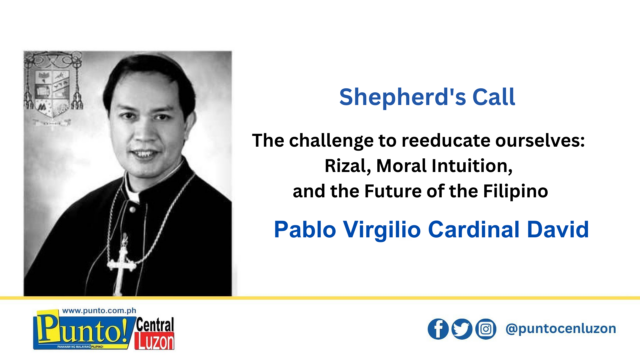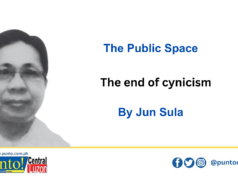(Please give yourself at least ten minutes to read this — and perhaps a bit more, if you find yourself pausing to reflect on the points that might resonate with you.)
IN HIS recent column, my brother, Randy David, asked a piercing question: What would Rizal advise? He reflected on how Jose Rizal sought change “with wisdom and reflexiveness, to the point of being perceived as merely a reformist.” Rizal believed that change had to go deeper than swapping leaders or rewriting laws—it had to spring from the very habits of the people.
Randy’s point resonates powerfully today. He wrote that nation-building cannot simply be reduced to changing constitutions or replacing politicians. What is needed, he said, is a grounding in moral intuition. I would go further and add: moral and spiritual intuition.
This is what disturbs me most about our present situation as a predominantly Christian nation. If we are indeed Christian in majority, why has our political life become so corrupt? Why has our faith not yet seeped into the very bones of our social institutions? Why has it not shaped the way we govern, do business, treat our poor, or steward creation?
I say this not to despair but to issue a challenge: we Filipinos need to reeducate ourselves. And by education I mean something more fundamental than formal schooling. Ivan Illich once warned us never to equate education with schooling, for schools can sometimes become instruments of miseducation. Real education, he argued, is rooted in lived experience, shared wisdom, and the cultivation of virtues that make life truly human.
Rizal and the Formation of Intuition
Jose Rizal knew that freedom from Spain was meaningless if Filipinos simply copied their oppressors. “The slaves of today could be the tyrants of tomorrow,” he warned.
Independence without the formation of conscience would merely recycle oppression under a new mask.
What Rizal was pointing to, though he did not use the phrase, was the need to form what philosophers now call moral intuitions. These are not the rules we memorize from textbooks or the slogans we recite during flag ceremonies. Moral intuitions are the cultivated instincts that tell us, often without much deliberation, what is right or wrong, good or bad, worthy or shameful. They are the second nature that shapes the kind of people we become.
Think of what many of us learned at home, in kindergarten, or from the catechism teacher: do not lie, share what you have, respect elders, say sorry when you hurt someone, love God and love your neighbor. These are simple lessons, but they form the ground of our humanity. Robert Fulghum once wrote, “Everything I needed to know I learned in kindergarten.” I would extend that: much of what we need to reeducate ourselves as a nation we first learned in our families, our playgrounds, and our catechism classes.
The tragedy is that as we grow older, these lessons often get drowned out by the noise of ambition, power, and greed. Our institutions do not reinforce them. Instead, they sometimes teach us to cheat, to exploit, to bend the rules, to put family or faction above truth and justice.
Lessons from Philosophers and Theologians
Here is where some modern thinkers can help us see what is at stake.
Alasdair MacIntyre, in his classic After Virtue, argued that societies fall into moral confusion when they lose the traditions that sustain virtue. Laws and procedures are not enough; what we need are shared practices that cultivate honesty, courage, justice, and generosity. Without these virtues, no constitution will save us.
Charles Taylor, in Sources of the Self, spoke of the “moral sources” that give societies their sense of direction. When a people forget their moral sources, they drift into cynicism or relativism. Taylor’s insight is crucial for us: Christianity is supposed to be our moral source, but has it truly shaped our public life? Or have we treated it as a weekend ritual rather than a fountain of moral intuition?
Johann Baptist Metz, a German theologian who survived World War II, insisted that faith must awaken what he called dangerous memories—the memory of Christ crucified, the memory of the poor and oppressed of history. True faith, Metz said, cannot be reduced to private piety; it must form a public conscience that resists injustice. In our context, this means Christianity should empower us to resist corruption and exploitation, not merely comfort us in suffering.
And then there is Pope Francis, who has reminded us that politics is a “sublime form of charity.” This startling phrase means that politics, at its best, is not about personal gain but about the self-giving love that seeks the good of all, especially the most vulnerable.
Even outside Christianity, we can learn from the Confucian tradition, which taught that good governance depends not just on laws but on the virtues of rulers: benevolence (ren) and propriety (li). Leaders, Confucius said, must cultivate their character first, for without it, institutions collapse.
All these voices converge on the same truth: nation-building is, at its root, the formation of moral and spiritual intuitions.
Jesus and the Fulfillment of the Law
This was also the core of Jesus’ teaching. He clashed with Pharisees who clung to the letter of the law but missed its spirit. He insisted that the heart of the law was love of God and love of neighbor. He went further: love your enemies, pray for those who persecute you, do not return evil for evil.
When Jesus said he came not to abolish the law but to fulfill it, he meant precisely this: to embody it, to internalize it until it became second nature. True morality is not about ticking boxes but about living in such a way that love becomes instinct.
Imagine what kind of society we would have if such love became our collective intuition. Imagine politicians who instinctively shun bribery, business leaders who instinctively think of workers’ welfare, citizens who instinctively care for creation. This is what it would mean for Christianity to become not just a religion but a way of life that shapes our social structures.
The Miseducation of a People
The late Renato Constantino once wrote about “the miseducation of the Filipino.” He meant that colonial powers had trained us to look outward, to admire the foreign, to doubt ourselves. Randy David’s call to ground our nationhood in moral intuition is a challenge to overcome this miseducation.
But miseducation does not come only from colonialism. It also comes from systems that teach us to equate success with wealth, fame, or power; systems that reward cunning over honesty, influence over integrity. That is why we must reeducate ourselves—not only in schools but in families, churches, communities, and movements that form the heart.
This reeducation is urgent for young Filipinos today. You are bombarded daily with images that tell you your worth depends on followers, brands, or appearances. Resist that. Reclaim the intuitions you learned as children: honesty, kindness, fairness, care for the weak. These are not childish lessons; they are the seeds of a humane society.
A Work in Progress
Am I proud that we are a predominantly Christian country? Honestly, no. Not yet. For if we truly lived by our faith, corruption would not be so pervasive. But I do not despair. I say we are a work in progress.
History shows that societies can change. Rizal believed that transformation begins in small habits. A people who practice self-discipline, who form consciences in truth and love, who nurture solidarity with the poor—such a people will eventually build just structures.
This is not naïve idealism. It is the slow, patient work of reeducation. It is the task of making love second nature, of turning moral and spiritual intuitions into the invisible scaffolding of our national life.
Conclusion: What Rizal Would Advise
So, what would Rizal advise? He would tell us that freedom without conscience is hollow, that institutions without virtue are brittle, that politics without love is poison. He would urge us not to rely merely on swapping leaders or rewriting constitutions, but to reeducate ourselves in the school of life, in the virtues of honesty, justice, and love.
The Philippines is still young. We have stumbled, yes, but we are not doomed. We are a people capable of moral and spiritual renewal. If we commit ourselves to reeducating our instincts—to grounding nation-building in moral and spiritual intuition—then perhaps one day we will become not just a predominantly Christian country but a truly Christ-like society.
This, I believe, is Rizal’s unfinished dream. And this is the challenge we must now embrace.





